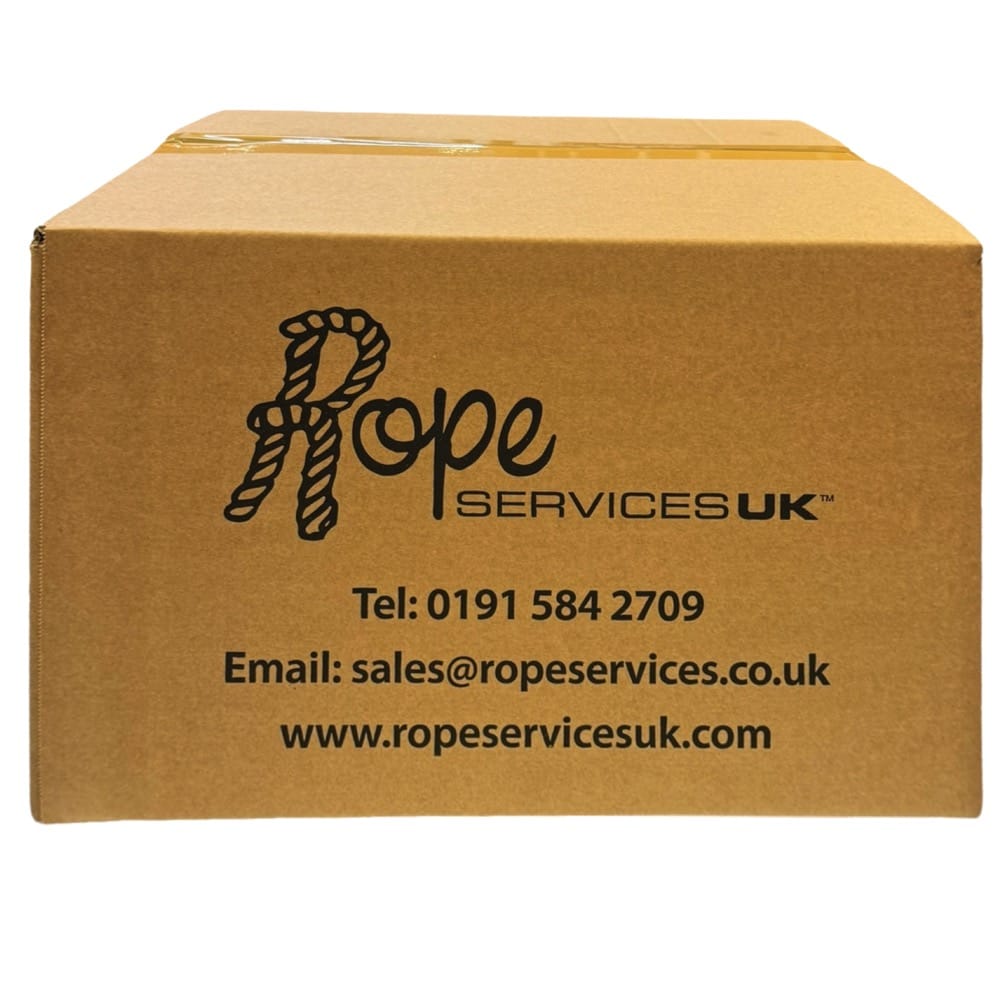25kg Braided Polypropylene Off-Cuts – Mixed Lengths & Diameters
| Quantity | Discount |
|---|---|
| Order 2 Boxes | 3% off |
| Order 3 Boxes | 5% off |
| Order 4 or more Boxes | 10% off |
£30.00
Our 25kg braided polypropylene off-cuts box provides a practical and cost-effective choice for anyone needing durable, lightweight rope. This box contains 25kg of braided polypropylene rope in various lengths and diameters, giving you a versatile selection suited for outdoor, marine, and DIY applications. Known for its strength and resilience, braided polypropylene rope offers dependable performance across a range of projects.
What’s in the Box?
Inside, you’ll find 25kg of braided polypropylene off-cuts, with mixed lengths and diameters. This assortment is ideal for anyone who values flexibility, as it allows you to select the right length and thickness for each task. Braided polypropylene is valued for its durability, water resistance, and lightweight feel, making it a reliable choice for projects both big and small.
Key Features of 25kg Braided Polypropylene Off-Cuts:
- Lightweight and Durable: Strong yet easy to handle, perfect for multiple uses.
- Water-Resistant: Suitable for wet environments, including marine applications.
- Mixed Lengths and Diameters: Offers flexibility to suit different project needs, from heavy-duty tasks to lighter applications.
Common Uses:
- Outdoor and Marine Use: Ideal for tasks that require water resistance, such as securing items on boats or near water.
- DIY and Home Projects: Great for crafting, setting up tents, or other general-purpose projects around the home.
- Gardening and Landscaping: Use for securing plants, fencing, or adding functional décor to outdoor spaces.
Why Choose Braided Polypropylene Off-Cuts?
Braided polypropylene rope offers a winning combination of strength, water resistance, and ease of use. This rope is both lightweight and durable, which makes it perfect for a wide variety of tasks. By choosing this 25kg braided polypropylene off-cuts box, you enjoy quality rope at a reduced price while supporting sustainable practices by using off-cuts.
Learn More:
For more on the care and optimal use of braided polypropylene rope, explore our Rope Guides and Product Care Tips. Discover additional uses and applications in our resources to get the most from your polypropylene off-cuts.
| Diameter | Max Length Per Reel | Approx Weight Per Reel | Approx Breaking Load |
|---|---|---|---|
| 2mm | 200 Metres | 0.40kg | 80kg |
| 3mm | 200 Metres | 1.06kg | 140kg |
| 4mm | 200 Metres | 1.44kg | 280kg |
| 6mm | 200 Metres | 2.80kg | 430kg |
| 8mm | 250 Metres | 6.25kg | 630kg |
| 10mm | 250 Metres | 9.00kg | 880kg |
| 12mm | 250 Metres | 14.00kg | 1,250kg |
| 16mm | 100 Metres | 20kg | 1,780kg |
Please note that all weights and breaking loads provided are approximate. The breaking loads may vary depending on how the rope is finished. It is imperative to subtract 10% from the breaking load for each splice made in the rope. Additionally, please be aware that weights can fluctuate, particularly with natural products, due to differences in manufacturing processes and materials utilised.
Synthetic Rope and Its Properties
Synthetic rope is made from man-made fibers such as nylon, polyester, polypropylene, and polyethylene. These ropes are known for their high strength, durability, and resistance to various environmental factors. Unlike natural ropes, synthetic ropes do not absorb water, making them ideal for use in wet and outdoor environments. However, synthetic ropes have their own set of characteristics and considerations that you should be aware of.
Behavior in Wet Conditions
One of the key advantages of synthetic ropes over natural ones is their minimal water absorption. Synthetic ropes generally do not shrink or expand when exposed to moisture, making them highly reliable in marine, industrial, and outdoor applications. However, while they do not absorb water, some synthetic ropes may become slippery when wet, which can affect handling and knot-holding capabilities.
Effects of UV Exposure
Unlike natural ropes, synthetic ropes are resistant to rot and mildew, but they can be affected by prolonged exposure to UV rays. Over time, UV exposure can weaken the fibers, causing the rope to degrade and lose strength. To mitigate this, synthetic ropes can be treated with UV inhibitors or stored out of direct sunlight when not in use.
Resistance to Chemicals and Abrasion
Synthetic ropes are generally more resistant to chemicals and abrasion compared to natural ropes. For instance, nylon and polyester ropes are highly resistant to various oils, acids, and alkalis, making them suitable for harsh industrial environments. Additionally, these ropes have excellent abrasion resistance, which means they can withstand rough surfaces without significant wear.
Elongation and Stretch
Different types of synthetic ropes have varying degrees of elongation. For example, nylon rope is known for its elasticity, which allows it to absorb shock loads without breaking. This makes nylon rope ideal for dynamic applications such as climbing, towing, and mooring. On the other hand, polyester rope has low stretch, making it suitable for applications where maintaining tension is critical.
Care and Maintenance
To extend the lifespan of synthetic ropes, it’s important to follow proper care and maintenance practices. Regularly inspect the rope for signs of wear, abrasion, or UV damage. If the rope shows significant signs of wear, such as fraying or thinning, it should be replaced to ensure safety and performance.
Storage Considerations
When storing synthetic ropes, keep them in a cool, dry place, away from direct sunlight and chemicals. Coiling the rope properly and avoiding tight bends can also help prevent kinks and maintain the rope’s integrity.
Summary
Synthetic ropes offer numerous advantages over natural ropes, including resistance to water, rot, and chemicals. They are durable and strong, making them suitable for a wide range of applications. However, it’s important to be aware of their susceptibility to UV damage and to take appropriate measures to protect the rope from prolonged exposure. By properly maintaining and storing synthetic ropes, you can ensure their longevity and reliable performance in various conditions.



